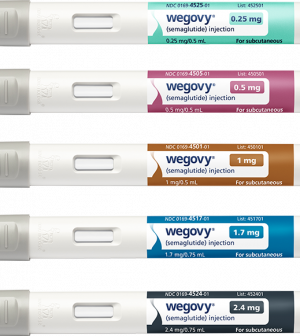- Could Your Grocery Store Meat Be Causing Recurring UTIs?
- Are You Making This Expensive Thermostat Error This Winter?
- Recognizing the Signs of Hypothyroidism
- 10 Strategies to Overcome Insomnia
- Could Artificial Sweeteners Be Aging the Brain Faster?
- Techniques for Soothing Your Nervous System
- Does the Water in Your House Smell Funny? Here’s Why
- Can a Daily Dose of Apple Cider Vinegar Actually Aid Weight Loss?
- 6 Health Beverages That Can Actually Spike Your Blood Sugar
- Treatment Options for Social Anxiety Disorder
FDA Approves Wegovy to Help Prevent Heart Attack, Stroke

Wegovy (semaglutide), the weight-loss version of blockbuster diabetes drug Ozempic, was approved on Friday by the U.S. Food and Drug Administration to help prevent heart attack, stroke and heart death.
“Wegovy is now the first weight-loss medication to also be approved to help prevent life-threatening cardiovascular events in adults with cardiovascular disease and either obesity or overweight,” Dr. John Sharretts, director of the Division of Diabetes, Lipid Disorders and Obesity in the FDA’s Center for Drug Evaluation and Research, said in an agency statement.
“This patient population has a higher risk of cardiovascular death, heart attack and stroke,” Sharretts explained. “Providing a treatment option that is proven to lower this cardiovascular risk is a major advance for public health.”
According to the FDA, over 70% of U.S. adults are overweight or obese, putting them at added risk for heart attack or stroke.
In one multinational study involving over 17,600 people, participants received either injected Wegovy or a placebo injection. All participants also got standard-of-care management of their blood pressure and cholesterol plus counseling on exercise and healthy eating.
“Wegovy significantly reduced the risk of major adverse cardiovascular events [cardiovascular death, heart attack and stroke], which occurred in 6.5% of participants who received Wegovy compared to 8% of participants who received placebo,” the FDA said.
It’s thought that this expanded approval from the FDA could remove barriers from insurance companies when it comes to covering Wegovy. That could greatly expand the number of people who might be prescribed the drug.
Wegovy does have potential side effects, the agency said, including nausea, diarrhea, vomiting, constipation, abdominal (stomach) pain, headache, fatigue, dyspepsia (indigestion), dizziness, abdominal distension, belching, flatulence, low blood sugar in patients with diabetes, flatulence and heartburn.
Patient taking Wegovy may also face upped risks for inflammation of the pancreas (pancreatitis), gallbladder problems (including gallstones), low blood sugar, acute kidney injury, hypersensitivity reactions, diabetic retinopathy (damage to the eye’s retina), increased heart rate and suicidal behavior or thinking.
Using Wegovy along with insulin also raises risks for low blood sugar, so people who take insulin should talk with their doctor before starting Wegovy, the FDA said.
“The prescribing information for Wegovy [also] contains a boxed warning to inform health care professionals and patients about the risk of thyroid C-cell tumors,” the FDA said, so it should not be used by people with a personal or family history of medullary thyroid carcinoma.
More information
Find out more about Wegovy and similar drugs at the Cleveland Clinic.
SOURCE: U.S. Food and Drug Administration, news release, March 8, 2024
Source: HealthDay
Copyright © 2026 HealthDay. All rights reserved.










